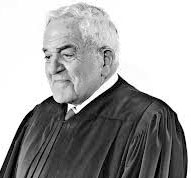Arab Americans
Judge Robert Doumar
Robert George Doumar (born 1930) is a United States federal judge.
Early life, education, and career
Doumar’s father, George Doumar, was from Syria and immigrated to America in 1901. His mother came from Lebanon later in an arranged marriage. Both were Arabic-speaking Christians and both became U.S. citizens. The family-owned eatery,Doumar’s, in Norfolk, Virginia still exists there, and features curb service, homemade barbecue, and handmade ice cream cones. Doumar’s uncle, Abe Doumar, is credited with inventing the ice cream cone.[1]
Born in Norfolk, Doumar received a B.A. from the University of Virginia in 1951 and an LL.B. from the University of Virginia School of Law in 1953. He was in the United States Army from 1953 to 1955, and was in private practice in Norfolk from 1955 to 1981. He ran, unsuccessfully, as a Republican for the Virginia House of Delegates in 1959 and 1961. He also lost astate Senate bid in 1967. He is married to the former Dorothy Mundy, who served as the Rector of Old Dominion Universityin Norfolk. He has two children and six grandchildren.[1]
Federal judicial service
As a delegate to three Republican national conventions, Doumar met California Governor Ronald Reagan, with whom he shared a skepticism about government and an admiration for individual rights. After Reagan won the White House, SenatorJohn Warner, a law school classmate, sponsored Doumar for the bench. On November 5, 1981, President Reagan nominated Doumar to a seat on the United States District Court for the Eastern District of Virginia vacated by Richard B. Kellam. Doumar was confirmed by the United States Senate on December 3, 1981, and received his commission the same day. He received am LL.M. from the University of Virginia School of Law in 1988, and assumed senior status on April 30, 1996.
Judge Doumar presided over the case of Yaser Esam Hamdi in the cases of Hamdi v. Rumsfeld and Jeffrey Spruill v.U.S. 243 F. Supp. 2d 527, 2002 U.S. Dist. LEXIS 25492 (E.D. Va., 2002). Judge Doumar ruled that a U.S. citizen designated as an enemy combatant was entitled to a lawyer, and that the government had to provide evidence justifying his detention. The Fourth Circuit reversed Judge Doumar, but the Supreme Court reversed the Fourth Circuit and upheld Judge Doumar’s basic rulings, 8-1, with multiple opinions. 542 U.S. 507 (2004).
He also presided over the case against the Government of Sudan arising out of the bombing of the U.S.S. Cole in Yemen.
References
- ^ Jump up to:a b Washington Post, September 6, 2002.
- Robert G. Doumar at the Biographical Directory of Federal Judges, a public domain publication of the Federal Judicial Center.




